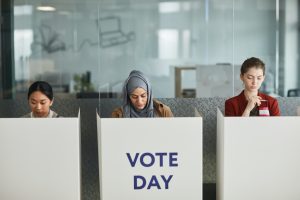Mallory Harrington on October 9, 2023
- ABC’s new season of The Bachelor centers around a 72-year-old “Golden Bachelor.” Deborah Carr (Professor of Sociology at Boston University) wrote an opinion piece for CNN on what dynamics we may see unfold over the season based on her expertise on aging. Carr anticipates that: 1) discussions of health will be important bonding moments, as managing health is salient in older adults’ lives; 2) family approval of the relationship will be crucial, as older adults are often merging two families in romantic relationships; and 3) marriage may be less of a focus, as increasing numbers of older adults are cohabitating or “living apart together.” To learn more on this subject, read a recent TSP Discovery on Older Adults on the Dating Market.
- The New York Times featured new research from Nick Graetz (Postdoctoral Research Associate at the Princeton University Eviction Lab), Carl Gershenson (Project Director at the Princeton University Eviction Lab), Peter Hepburn (Assistant Professor at Rutgers University), Matthew Desmond (Professor of Sociology at Princeton University), and additional colleagues from the Census Bureau. The study found that children – particularly children under 5 – are disproportionately affected by eviction filings. The article suggests that both the financial effect of having young children and discrimination from landlords (who often see children as an unwanted risk) contribute to this trend. “When I started writing about these issues, I kind of thought kids would shield families from eviction,” Desmond commented. “But they expose families to eviction.”
- David Roediger (Historian and Professor of American Studies at the University of Kansas) wrote a piece for Mother Jones on the “mirage of the middle class.” Referencing C. Wright Mills’ work on the new middle classes of the 1950s, Roediger discusses how the imprecision of the term “middle class” is mobilized by politicians in election seasons.
- For Hispanic Heritage Month, Mark Hugo Lopez (Director of Race and Ethnicity at the Pew Research Center) and Christina Mora (Associate Professor of Sociology at Berkeley) appeared on PBS News to discuss the terms “Hispanic” and “Latino” and how identity language has shifted over time. Mora discussed the push from Mexican, Puerto Rican, and Cuban populations in the 1960s/70s to get the United States to establish a panethnic census category. Lopez discussed how Latino adults use country of origin terms in discussing their identities.
- Aarushi Bhandari (Assistant Professor of Sociology at Davidson College) wrote an article for The Conversation, reflecting on how news of the strike-ending deal between the Writers Guild of America and the Alliance of Motion Picture and Television Producers was eclipsed by celebrity headlines. Six conglomerates own 90% of media outlets, giving them significant power over media narratives. Bhandari argues that the limited coverage of the WGA deal “fits into a longer historical pattern of tension between labor movements and corporate media” in which “corporate media has framed disproportionately negative narratives about strikes and union activities.”






Comments 1
KINGS — October 25, 2023
Amazing Blog Thanks for sharing this Helpful information. this is Very Helpful & more useful for me. we offer top-notch education tailored to your needs. Join us on the path to success. Do Bachelors,Diploma,Online MBA from King's Business School UAE(Dubai) and make your future more easy.